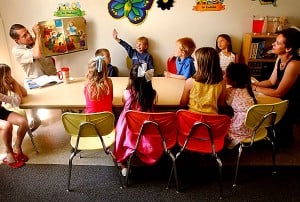(Excerpted from Sunday Schooling Our Kids Out of Church: The True Story of How One Congregation Dropped Sunday School to Save its Soul)
About 40 years ago a profound shift took place in many Christian congregations across the country…for all the right reasons…with one troubling unintended consequence:
In the 1960’s and 1970’s, my generation, Baby Boomers, rebelled against the “institutional church” just as we did with every other institution our parents built/supported. We rebelled by dropping out: 2/3rds of my generation dropped out of church. In the late 1970’s/early 1980’s, innovative pastors and congregations of all sizes and denominations looked for ways to draw Boomers back to church. They began to create worship experiences based on the unique “personality” of the Boomer generation. These churches went “contemporary,” “seeker,” and/or “seeker-friendly.” Because these were the primary parenting years for Boomers, these congregations recognized the need to not only provide Boomer-friendly worship experiences for adults, but the need to create dynamic experiences for their children as well, knowing that if the kids wanted to come back, the parents were more likely to come back. 
So began a shift from kids worshipping with the big people for one hour followed by all ages attending a second hour of Sunday School, to churches creating Sunday School experiences for kids that ran concurrently with their parents’ worship service. In other words, kids and parents were separated from each other, having different Sunday experiences.
Again, the reasons were right…or so we thought. Because these new Boomer services had a sense of evangelism about them (trying to win Boomers back to the church) we didn’t want anything to interrupt their focus…like squirming or crying or screaming kids. Church leaders sensed that Boomer parents wanted the one hour break from their kids—that they wanted to focus on their own spiritual life for an hour away from the distraction of their children. And, again, we assumed, reasonably so, that worship targeted to adult boomers would not be all that engaging for kids. So dynamic Sunday school programs were created to engage the kids at their level in their language while their parents were in worship. In fact, some churches didn’t (and don’t) allow kids into big people worship at all.
The result: Many of these innovated congregations had a positive, significant impact on the lives of disenfranchised Boomers and their kids. Many saw their congregations and their children’s ministries grow exponentially. The evangelism imperative to reconnect with Boomers seemed to work.
But there was (and is) one huge unintended consequence: We have raised the largest unchurched generation in the history of our country.
Admittedly, there are many reasons why each generation in our culture is increasingly distanced from the church. Some have to do with societal shifts that have nothing to do with the church. Some have to do with the inability of the church to articulate the Gospel in compelling ways.
But perhaps one of the reasons has to do with the Sunday School shift…as we shifted kids out of the main worship experience, en-culturated them in their own program, and robbed them of any touch points with the rest of the body of Christ. Another way of saying it: by segregating our kids out of worship, we never assimilated them into the life of the congregation. They had no touch points. They had no experience. They had no connection with the main worship service—its liturgy, its music, its space, its environment, and its adults. It was a foreign place to them. And so…once they finished with the kids/or youth program, they left the church.
With good intentions we attempted to raise kids to be Christians, but we didn’t raise them to be Churched Christians. And perhaps that, in part, is why so few of them attend a church today. We’ve essentially “Sunday-Schooled” them out of church—because we never assimilated them into church. We never “church-broke” them.
For years I was an advocate of this model. And I still, in many ways, feel the tug to stick with it. But I remember reading a study some 20 years ago that said back then what our experience is now confirming: Kids who attend Sunday School but never attend church are more likely not to attend church as adults. (It makes sense, doesn’t it?) And kids who attend worship and never attend Sunday School are far more likely to attend worship as adults. (Those who attend a mixture of both are also more likely to assimilate into worship as adults.)
A few weeks ago I preached on this in our church. One of our members pulled me aside and told me a story: When he was small, he looked up at his dad who had tears in his eyes as the congregation sang, “Spirit of the Living God.” After church he asked his dad why he was so sad during church. Dad said, “I’m not sad. I was just remembering how when I was a boy like you I stood next to my dad singing, ‘Spirit of the Living God.’ And now here I am, singing that song with my son.” How are we creating those kinds of touch points for our kids?
Jesus said, “Let the children come to me. For the kingdom of God belongs to such as these.”
What does it look like in the 21st Century to be a church that belongs to such as these kids? What does it look like to be a church that makes children the priority of the Kingdom? That raises them to be “Churched Christians?” What does it mean that all of us are the Body of Christ together?
It may be an upstream challenge. Many of our churches are used to separating the kids from the adults and having squirming, squealing kids may dramatically change the worship dynamic. Many parents want their kids in Sunday School during worship and may even demand it…or will leave to attend a church that does so.
But what is our ultimate call? To create programs? Or to raise disciples (i.e., followers of Jesus committed to his church and his world)? And what might that that calling to raise “churched” disciples look like?
(Excerpted from Sunday Schooling Our Kids Out of Church: The True Story of How One Congregation Dropped Sunday School to Save its Soul)









